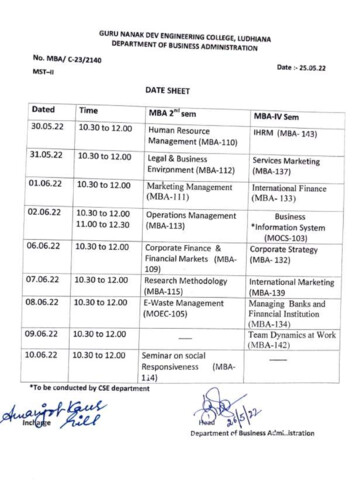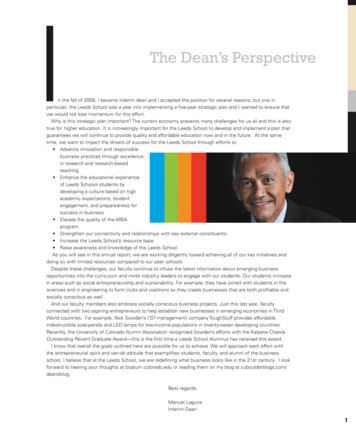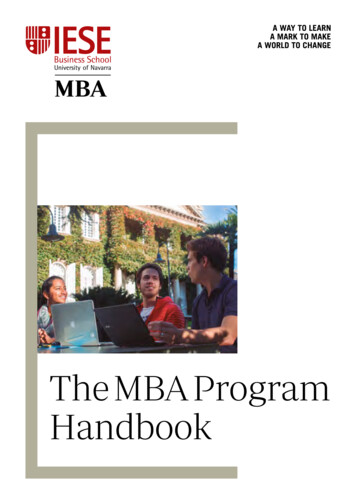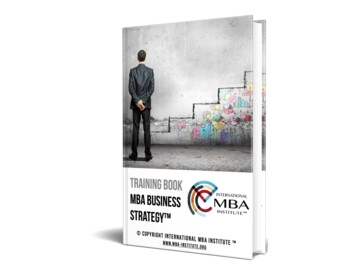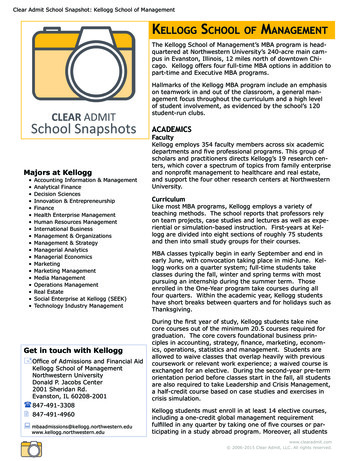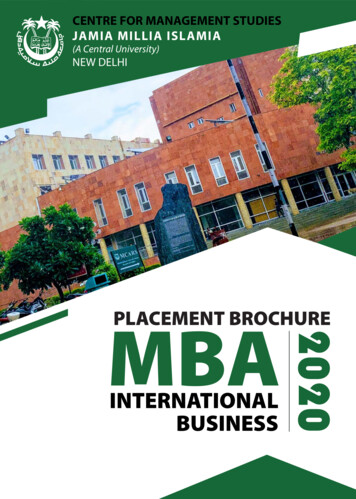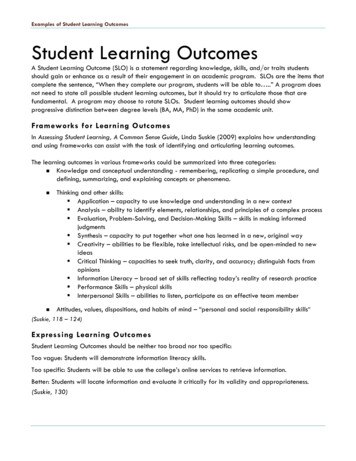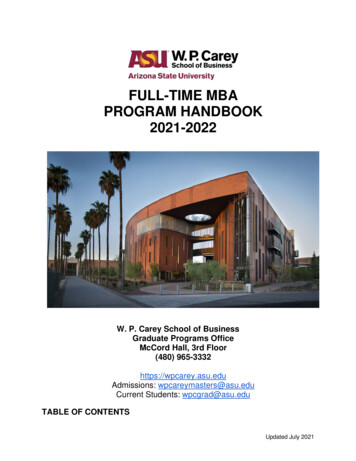
Transcription
FULL-TIME MBAPROGRAM HANDBOOK2021-2022W. P. Carey School of BusinessGraduate Programs OfficeMcCord Hall, 3rd Floor(480) 965-3332https://wpcarey.asu.eduAdmissions: wpcareymasters@asu.eduCurrent Students: wpcgrad@asu.eduTABLE OF CONTENTSUpdated July 2021
WELCOME TO THE W. P. CAREY SCHOOL OF BUSINESSDIVERSITY, EQUITY, & INCLUSION AT W. P. CAREY346PROGRAM OVERVIEWPROGRAM CURRICULUMFull-time MBA CoreRequired ConcentrationsW. P. CAREY SCHOOL OF BUSINESS GRADUATE STUDENT CONDUCT ANDPROFESSIONALISM POLICY2021-2022 MASTER OF BUSINESS ADMINISTRATION ACADEMIC POLICIESACADEMIC INTEGRITYW. P. CAREY FULL-TIME MBA POLICY ON OUTSIDE EMPLOYMENTW. P. CAREY TUITION REFUND POLICYW. P. CAREY SCHOLARSHIP CANCELLATION POLICYSTUDENT RESOURCESGraduate Program OperationsCareer Management and Employer EngagementProfessional Development Funding OptionsGraduate Student Clubs and OrganizationsHealth and WellnessFacilities Resources777913171920212222232323232424STUDENT ACKNOWLEDGMENT2
WELCOME TO THE W. P. CAREYSCHOOL OF BUSINESSSolutions for the planet mean developing problem-solvers from around the globe. Fromthousands of outstanding students who join us every year from around the world to our worldrenowned faculty representing six continents, the W. P. Carey School welcomes diversity andencourages global thinking.Grad school is a major undertaking, whether you’re returning to school full-time or you’reearning a degree while you work. At the W. P. Carey School, we’re here to help you succeed inthe classroom and beyond.Whether you have questions about the curriculum, financial aid, or how to take advantage ofcareer resources for W. P. Carey graduate students, you can get all the answers you need righthere.We measure success not by who we exclude, but who we include, with one vision in mind:To create leaders who rethink the nature of business, engage the world, and create a betterfuture.Check out our news and research website to learn more about our community’s success.RankingsThe W. P. Carey School of Business delivers excellent quality and great value. It is one of thetop business schools in the country, highly ranked for academics, groundbreaking research, andstudent outcomes. Read more about the current rankings here.3
DIVERSITY, EQUITY, & INCLUSION ATW. P. CAREYAt W. P. Carey, we say that “business is personal.” Each student, each faculty member, eachemployee matters, intrinsically, as a human being. Yet we also must recognize times where weas a community have fallen short of that ideal, and how historical prejudice and systemic racismhave pushed members of our school to the margins.We are committed to doing better, and unequivocally state our support of Black lives, Nativecommunities, immigrants, members of the LGBTQIA community, people with disabilities, andothers who live at the intersections. You are welcome at W. P. Carey, and this is what you canexpect from us.Commitments to diversity, equity and inclusion We embrace open access to education and opportunity for all students as beingcentral to our mission. We believe that diversity is a necessary part of excellence, and reject any falseopposition of diversity and merit. We support robust and respectful discussion of the most pressing issues insociety from the wide variety of perspectives in our community. We respect, listen to, and center the voices of marginalized groups, andrecognize that the impacts of our actions matter more than the intention. We are unequivocal in our support of underrepresented and historicallymarginalized groups, and will not tolerate discrimination or hate.Diversity, equity, and inclusion (DEI) initiativesThe initiatives below are a partial list of the many DEI activities being pursued and considered atW. P. Carey.Diversity, Equity, and Inclusion Committee - formed in response to ongoing police violenceagainst Black Americans, the DEI committee is now a permanent part of W. P. Carey; the groupdirects all DEI initiatives at W. P. Carey and serves as an advisory board to school leadership.College Data Committee - this group is charged with compiling and distributing relevant DEIdata for W. P. Carey; this includes diversity metrics, surveys, and benchmarking.Inclusive Teaching & Learning Committee - a combination of faculty, staff, and studentcommittee members working to integrate DEI principles into W. P. Carey curriculum andclassrooms.4
DEI training for faculty and staff - “To be Welcoming” training, in partnership with ASU andStarbucks, suggested for all staff; also exploring future mandatory training options foremployees and students.Diversifying purchasing - In concert with ASU purchasing and community groups, we are takingan intentional look at diversifying W. P. Carey purchases, including food, supplies, and services.Inclusive onboarding - Human Resources is creating a booklet for new employees that includesemployee resource groups and culturally relevant services, such as Black salons, doctors, andmore.Diversifying recruiting - Human Resources and student recruiting functions are in the earlystages of identifying more inclusive recruitment practices, including expanded recruitment fromHBCUs, continued involvement in the PhD Project, and more.Expanded access to mentors - using the existing W. P. Carey mentorship program as a startingpoint, expand the number of qualified minority mentors for the undergraduate, graduate, andExecutive Connections program.W. P. Carey is also actively involved with the larger ASU community’s commitment to supportBlack students, faculty, and staff. Read more about university-led efforts.Land AcknowledgementThe W. P. Carey School of Business acknowledges the 22 Tribal Nations that have inhabitedthis land for centuries. Arizona State University's four campuses are located in the Salt RiverValley on ancestral homelands of many Indigenous peoples, including the Akimel O’odham(Pima) and Pee Posh (Maricopa), whose care and keeping of these lands allows us to be heretoday and provides a guide for our relationship with these lands in the future. W. P. Careyacknowledges the sovereignty of these tribal nations and seeks to foster an environment ofsuccess and possibility for American Indian students, and to work alongside Indigenous peoplein business practices and acknowledges that support Native experiences and prosperity.More resources: ASU Student Accessibility and Inclusive Learning ServicesStudents with FamiliesInternational Student EngagementOut @ ASUASU Council of CoalitionsPat Tillman Veterans Center5
PROGRAM OVERVIEWThe W. P. Carey Full-time MBA: Integrates data analytics in the core curriculum so students can lead in a datarich world Partners students with executive mentors to enhance your leadershipcompetencies Develops real-world solutions for companies and community organizationsthrough Intellectual Fusion Learning LabsWith a 15 million investment in career management resources and 1:1 career coachingevery step of the way, students are prepared for their next great challenge. Through aninnovative curriculum designed for where industry, economies, and the world is headed,students become leaders who see the big picture and embrace change.As a STEM-designated degree, the Full-time MBA allows eligible graduates on studentvisas access to an Optional Practical Training (OPT) extension for up to 36 months,helping international students gain additional real-world skills and experience in the U.S.6
PROGRAM CURRICULUMAll required core courses plus electives for a total of 60 credit hours.Full-time MBA CoreThe Full-time MBA core curriculum consists of 38.5 credit hours. All courses listed below arerequired for the Class of 2023.Fall SemesterMGT 525: Leadership & Teamwork (2 cr)Quarter 1ACC 502: Financial Accounting (2.5 cr)MGT 588: Sources of Competitive Advantage (2.5 cr)WPC 501: Statistics for Business (2.5 cr)WPC 502: Career Coaching (.5 cr)WPC 503: Managerial Communications (1.5 cr)Quarter 2FIN 502: Managerial Finance (2.5 cr)MKT 502: Marketing Management (2.5 cr)ECN 502: Managerial Economics (2.5 cr)SCM 502: Operations & Supply Chain Management (2.5 cr)Spring SemesterWPC 502: Career Coaching (.5 cr)Quarter 3CIS 503: Decision Making with Data Analytics (2.5 cr)MGT 502: Organizational Behavior (2.5 cr)LES 582 Ethical Issues for Managers (1.5 cr) or Q7Quarter 4ACC 503: Managerial Accounting (2.5 cr)Summer SemesterWPC 584: Internship (.5 cr)Fall SemesterBUS 593: Interdisciplinary Applied Learning Lab (3 cr) or springQuarter 5MGT 526: Future World of Work (1 cr)Spring SemesterBUS 593: Interdisciplinary Applied Learning Lab (3 cr) or fallQuarter 7LES 582: Ethical Issues for Managers (1.5 cr) or Q3Quarter 8MGT 589: Strategic Management (3 cr)Required Concentrations7
Students are required to complete at least one concentration consisting of 12 credits from thefollowing:Business AnalyticsCourses in business analytics (BA) will build on your quantitative and analytical skills, helpingyou learn to derive value from data to create a competitive business advantage. Thisconcentration will enhance your knowledge in applied analytics, regression modeling, analyticaldecision modeling, data mining, and marketing analytics.ConsultingThe consulting industry represents a diverse portfolio of professional services firms that helptheir clients improve performance by providing objective advice and assistance related to theStrategy, Talent and Human Resources, Information Technology, Financial Resources, andOperations of an organization.EntrepreneurshipA concentration in Entrepreneurship (EShip) will develop your skills in the areas of businessplan development, opportunity assessment, new venture planning and development,commercialization, funding opportunities, and market growth.FinanceThe Finance (FIN) concentration focuses on corporate finance and offers a unique perspectiveon investment decisions, the management of business and financial risk, and resourceallocation for the most positive impact on shareholder value.Information ManagementA concentration in Information Management (IM) will develop your skills in the areas ofenterprise modeling, database systems, electronic commerce, data warehousing, and businessprocess analysis.MarketingThe Marketing (MKT) concentration blends marketing strategy with services management.Fueled by the expertise of the W. P. Carey School’s internationally respected Center forServices Leadership, this emphasis delivers distinctive knowledge and skills sought by firmsacross industries that use services for a competitive advantage.Supply Chain ManagementThe Supply Chain Management (SCM) concentration incorporates core business knowledgewith the broad expertise of one of the top-ranked supply chain programs in the United States.Integrating all aspects of products and their service life cycles, from design to delivery todisposal, you will learn to be a strategic thinker, excellent analyst, effective communicator andteam leader focused on cost savings and increasing revenue.8
W. P. CAREY SCHOOL OF BUSINESSGRADUATE STUDENT CONDUCT ANDPROFESSIONALISM POLICYWe, the students of the W. P. Carey Master’s programs, are committed to maintaining thehighest levels of honesty, integrity, and professional courtesy for ourselves and amongst ourclassmates. We believe that ethical behavior is not only the cornerstone of a good academicprogram, but of good business as well. As such, we are steadfast in our commitment to thefollowing principles: Academic Integrity — We view the W. P. Carey Academic Integrity Policy as a living,breathing document, not just concepts on a page. As such, we are resolute in ensuringthat we abide by the principles contained within, both in letter and in spirit. Furthermore,we will hold our classmates to the same high standards to which we hold ourselves. Consideration of Others — As W. P. Carey students, we believe that we should treatothers as we wish to be treated. To this end, we will be considerate of classmates,professors, and recruiters in all aspects. Furthermore, we will constructively add to thecollaborative environment by helping and encouraging others. Professionalism — As W. P. Carey students, we believe that the behaviors we practicetoday will become a habit in the future. To that end, we are committed to act in aprofessional manner in all school settings, including classes, networking events, andinterviews. We will be cognizant of the fact that we are representing the program and ourclassmates at all times.Professionalism PolicyProfessionalism, broadly speaking, includes ethical decision-making, consideration of others,and demonstration of personal accountability. Exhibiting professional behavior is integral to apositive learning environment within the university and promotes innovation, openness todiversity, integrity, and mutual respect for students, faculty, and staff.W. P. Carey students are expected to treat others as they wish to be treated. Students will beconsiderate of classmates, professors, staff and recruiters in all aspects and commit to acting ina professional manner in all school settings, including classes, sponsored events, andinterviews.CommunicationAll communication, whether oral or written, should be in a professional tone and format. In yourcourses your instructor should set forth procedures for communication including posted officehours, making appointments, and providing contact information.9
Examples of behaviors expected when participating in activities associated with W. P. CareySchool of Business: Communicate clearly, promptly and in a respectful manner with students, staff,colleagues, instructors, and the public. Participate in verbal and written interactions in an equitable and respectful manner. Maintain professionalism in interpersonal relationships, manner, appearance, hygieneand communication (including electronic communication). Accept feedback and make good faith attempts to improve performance based onfeedback.Examples of behaviors that do not meet this standard: Consistently interrupt, show disrespect toward, ignore or belittle people. Use or display inappropriate language (profanity, obscenities, hate speech) withstudents, faculty, staff, and/or other professionals. Consistently make disruptive, rude, argumentative, confrontational or intimidatingcomments in a classroom or professional setting.ClassroomThe classroom (in-person or online) should be an environment that fosters learning and sharingideas. This type of environment works best when students arrive to class on time, prepared, andwith an open mind. It is vital to the learning process that each student demonstrates respect forthe instructor, classmates, and course content.Examples of behaviors expected when participating in activities associated with W. P. CareySchool of Business: Address, with the appropriate faculty member or administrator, any instance in whichthere is a suspicion or knowledge of an academic integrity violation or professionalmisconduct by a student or faculty member. Unless it is appropriate for the class activity, silence all electronic devices when youenter the classroom. Respect your professors, teaching assistants, and peers by refraining from disruptivebehavior such as engaging in non-classroom related activities during class time.Examples of behaviors that do not meet this standard: Fail to complete or follow through on projects and/or commitments on time and bydeadlines. Consistently disparage professional development activities or academic learning. Disruptive or inappropriate behavior, including consistent absence or excessive tardiesto class(es) without an excusable reason.Co-curricularCo-curricular conduct — behavior beyond the classroom — including appearance, behavior,and online presence has far reaching effects. Faculty, employers, recruiters, and future10
professional peers may form positive or negative perceptions based on what they see or hear.W. P. Carey students should conduct themselves as professionals with integrity in theclassroom, in the workplace, and in associated activities.Examples of behaviors expected when participating in activities associated with W. P. CareySchool of Business: Act as a responsible group member: attend meetings and contribute equitably todiscussions, workload, and presentations. Demonstrate respect and care for University property. Honor appointments with faculty, staff, advisors, recruiters, and employers. Understand that employers may search social media sites when making hiring decisions.Examples of behaviors that do not meet this standard: Violation of school, university, or workplace policies, or the law. Fail to honor commitments to attend events, which includes arriving on time anddressing appropriately. Dress in attire that could be considered inappropriate for the event, classroom, orworkplace. Misuse electronic media, using threatening or self-destructive behaviors. Disruptive or inappropriate behavior during experiential learning opportunities, such asconferences, field studies, international travel, etc.TechnologyUse of personal or public desktops, tablets, laptops, cell phones and other electronic deviceswhile engaging in university business should be conducted in a respectful and professionalmanner.Examples of behaviors expected when participating in activities associated with W. P. CareySchool of Business: Be mindful of using technology in academic and non-academic settings (meetings,internships, at the workplace, and/or University sponsored events). Respect public workstations during use. Ensure space is clean and operable for futureuse and report faulty equipment to appropriate staff.Examples of behaviors that do not meet this standard: Use of devices that are distracting, and/or impede safe movement of others throughclassroom and non-classroom spaces (use of cords, wall plugs, etc.). Inappropriate use of university equipment for personal use or gain.If a student is reported as violating the Professionalism Policy, the Assistant Dean of AcademicAffairs will evaluate the information to determine an appropriate course of action to gather thefacts. A student alleged to have violated the Professionalism Policy will be provided notice ofalleged misconduct and provided with an opportunity to respond.11
If the student is found to be in violation of the Professionalism Policy, the Assistant Dean ofAcademic Affairs, in conjunction with the faculty director of the academic program, willdetermine the disciplinary action. For violations that are determined to be moderate in severity,remediation could include being put on academic probation combined with mandatory follow-upmeetings. For more severe violations or repeat behavior, consequences may be arecommendation for dismissal from the academic program.Any violation of the ASU Student Code of Conduct will be reported to the Office of StudentRights and ResponsibilitiesStudent ResourcesArizona Board of Regents Student Code of rizona State University Academic Integrity olicy12
2021-2022 MASTER OF BUSINESSADMINISTRATION ACADEMIC POLICIESThe academic records of graduate students are reviewed at the completion of each course toensure that satisfactory progress and minimum standards are being met. Students mustcomplete required courses in the order specified for the Master of Business Administration(MBA) degree. It is each student’s responsibility to understand how this policy may impacthis/her ability to complete the MBA degree. W. P. Carey School of Business GraduatePrograms reserves the right to enforce the academic policies outlined below.DEGREE REQUIREMENTS SUMMARY: To be eligible for a degree from the GraduateCollege, master’s degree students must maintain Satisfactory Academic Progress andachieve the benchmarks and requirements set by the individual degree programs as wellas the Graduate College. These, as well as all other Graduate College policies, can befound in the ASU Graduate Policies and Procedures.Satisfactory Academic Progress1. Maintain a minimum 3.00 for all GPAs. The iPOS GPA is calculated on all courses that appear on the student’s approvediPOS (with the exception of LAW and Transfer credits). Cumulative ASU GPA represents all courses completed at ASU during thegraduate career. The Overall Graduate GPA is based on all courses numbered 500 or higher thatappear on the transcript after admission to a graduate program or graduate nondegree. This includes shared coursework if in an approved acceleratedbachelor’s/master’s program. Courses with grades of “D” (1.00) and “E” (0.00) cannot appear on the iPOS but willbe included when calculating the Graduate GPA. Courses with an “I” grade cannotappear on the iPOS2. Satisfy all requirements of the graduate degree program.3. Satisfy the maximum time limit for graduation from the student’s graduate degree program.A student has six years for masters; for doctoral, five years or ten years fromcomprehensive exams (whichever comes first).4. Successfully pass comprehensive exams, qualifying exams, foreign language exams,and the oral defense of the proposal/prospectus for the thesis or dissertation.5. Successfully complete the culminating experience (capstone/thesis equivalency course,MGT 589) with a grade of B (3.00) or higher.6. Graduate students must remain continuously enrolled in their degree program. Failing todo so without a Graduate College approved Leave of Absence is considered to be a lackof academic progress and could result in discontinuation from the program.A student who fails to make satisfactory progress in pursuit of the MBA degree will be providednotice from the W. P. Carey Graduate Programs Office, Program Operations department assoon as the applicable grade(s) have been identified.COURSE COMPLETION REQUIREMENT: Students who wish to withdraw from the MBAcore curriculum should contact his/her Program Operations coordinator to discuss options,13
policies, and processes.a) Executive MBA and Full-time MBA are lock-step programs where core courses mustbe completed as scheduled. A student who withdraws from an MBA core coursewill not be permitted to continue coursework as scheduled.b) Upon receipt of an Incomplete (grade of an “I”) in any course, a student mustsubmit to his/her Program Operations coordinator a written plan, mutually agreedupon with the instructor and approved by the faculty director. The courseworkmust be completed prior to the start of the next term.c) Due to the lockstep nature of the MBA, failure to complete the course as outlinedin the agreement may result in a recommendation for discontinuation ordismissal.PROBATION: A W. P. Carey MBA student shall be placed on probation when he/she:a) receives a “C ” (2.33) or “C” (2.00) in any course applicable to MBA degreerequirements (courses and GPAs) and/orb) achieves a Cumulative ASU GPA or ASU Graduate GPA or Plan of Study (POS)grade point average (GPA) below 3.00, and/orC) has a significant or repeated violation of the W. P. Carey School of BusinessGraduate Conduct and Professionalism Policy, ASU Academic Integrity, orStudent Code of Conduct.A student on probation must work with his/her Program Operations coordinator to understandthe conditions and timeframes for making satisfactory academic progress in his/her degreeprogram. A student on probation is allowed to complete coursework to bring his/her grades toan acceptable level (3.0 or above) by the end of the program.DISCONTINUATION: A student shall be discontinued from the MBA program when he/shereceives: a “D” (1.00) or “E” (0.00) in any course applicable to MBA degree requirements(courses and GPAs) while not on probation, or a grade below “B” (3.00) on the thesis equivalency course, or an “I” grade and fails to complete coursework as outlined in the agreement.A student who is discontinued must either enroll in MGT 595 Continuing Registration orhave an approved leave of absence. A student must then resume his/her program asagreed and will be placed on probation upon return.Students who fail to maintain continuous enrollment must be readmitted to the programunder the degree requirements and policies in effect at the time of the new admission date.DISMISSAL: A student shall be recommended for dismissal from the MBA program and willnot be permitted to continue course work when he/she:a) is on academic probation and receives a third “C ” (2.33) or “C” (2.00) in anycourse applicable to MBA degree requirements (courses and GPAs), and/orb) is on academic probation and receives a “D” (1.00) or “E” (0.00) in any course applicable14
to MBA degree requirements (courses and GPAs), and/orc) is on academic probation and receives a grade below “B” (3.00) in the thesisequivalency course, and/ord) returns from discontinuation and receives a grade below “B-” (2.67) in any course applicableto MBA degree requirements (courses and GPAs), and/ore) has significant or repeated violation of the W. P. Carey School of Business GraduateConduct and Professionalism Policy, ASU Academic Integrity, or Student Code of Conduct.GRADE APPEAL POLICY: Student academic grievance procedures in the W. P. CareySchool of Business normally consider matters where the relief sought is a change of a finalgrade. Formal grievance petitions must be submitted no later than ten business days after thestart of the next academic term; the process and decision on the grade grievance will becompleted by the end of that term. Unless dismissed, a student may continue courseworkduring the appeal process.Grounds for a grade appeal: Error in calculating the final grade for the course (e.g. arithmetic error) The criteria for determining the final grade were changed from what was specified in thesyllabus (e.g. 4 quizzes were given instead of 5 or weights of assignments werechanged) The evaluation system was not consistently and fairly applied to all students (e.g.Student A and Student B reported the same answer but had different scores for theassessment item)Grievance procedure: Student submits a grade appeal with the Office of Academic Affairs (Dean’sDelegate) Student discusses grievance with course instructor If a resolution cannot be reached with the instructor, student discusses grievance withFaculty Director and/or Department Chair. If a resolution cannot be reached with the Faculty Director, student should make anappointment to see the W. P. Carey Academic Integrity Officer. At the meeting, thestudent’s dispute will be heard again, and if it still cannot be resolved satisfactorily, aformal committee can be called to review the complaint. If the Office of AcademicAffairs determines no hearing is needed, the decision is final and may not be appealed. If the Office of Academic Affairs determines a formal hearing is warranted, the grievancewill be reviewed by the W. P. Carey Standards Committee who will then make arecommendation to the Dean. All decisions are final and may not be appealed.ACADEMIC INTEGRITY REQUIREMENT: A student who engages in academicmisconduct while attending a W. P. Carey graduate program will receive strict penalties asoutlined in ASU’s academic integrity policy. Those penalties ordinarily will range from aletter reduction in final course grade to expulsion from the program and School ofBusiness. The penalty will be decided by the course faculty member and the AssistantDean of Academic Affairs. All allegations of academic misconduct must be reported toprogram administrators. Any subsequent act of academic misconduct, regardless ofseverity, will result in dismissal from the program and the School of Business.15
The ASU student academic integrity policy lists violations in detail. These violationsfall into five broad areas that include but are not limited to:1. Cheating on an academic evaluation or assignment2. Plagiarizing3. Academic deceit, such as fabricating data or information4. Aiding academic integrity policy violations and inappropriatelycollaborating5. Falsifying academic recordsTUITION REFUND POLICIES: ASU Tuition Refund Policy W. P. Carey Program Tuition Refund PolicyGRADUATE COLLEGE IONS AND SPECIFIC ASU POLICIES:Probation: An official warning that a student is not progressing academically as requiredby the program/university. A student on probation is allowed to continue coursework.Discontinuation: Requires a student to take time off from the program based onacademic performance. The student will restart the program according to thediscontinuation agreement between the student and the Sr. Associate Dean. Uponreturn to his/her program, the student will be placed on academic probation.Dismissal: A student who is dismissed is no longer matriculated and will not be allowedto continue coursework. To be subject to dismissal, a student must first be placed onacademic probation.Continuous Enrollment: Once admitted to a graduate degree program or graduatecertificate program, students must maintain continuous enrollment and be registered for aminimum of one credit hour during all phases of their graduate education, including theterms in which they are admitted and graduate. Failing to do so without a GraduateCollege approved Leave of Absence is considered to be a lack of academic progress.Leave of Absence: Graduate students planning to discontinue registration for a semesteror more must submit a Leave of Absence request via their Interactive Plan of Study(iPOS). This request must be submitted and approved before the anticipated semester ofnon-registration. Students may request a maximum of two semesters of leave during theirentire program. A student with a Graduate College approved Leave of Absence is notrequired to pay tuition and/or fees, but in turn, is not permitted to place any demands onuniversity faculty or use any univ
welcome to the w. p. carey school of business 3 diversity, equity, & inclusion at w. p. carey 4 program overview 6 program curriculum 7 full-time mba core 7 required concentrations 7 w. p. carey school of business graduate student conduct and professionalism policy 9 2021-2022 master of business administration academic policies 13 academic .
